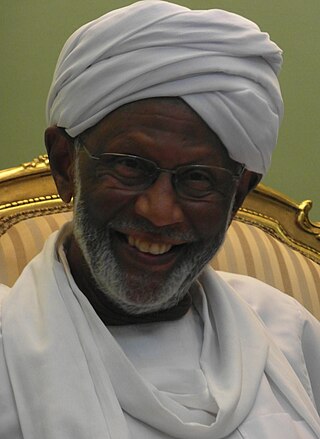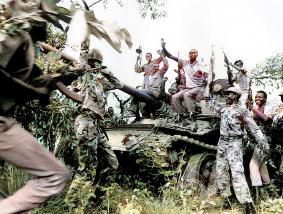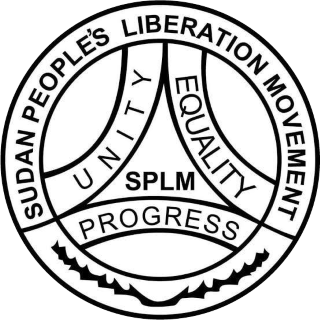Related Research Articles

Sudan, officially the Republic of the Sudan, is a country in Northeast Africa. It is bordered by the Central African Republic to the southwest, Chad to the west, Egypt to the north, Eritrea to the northeast, Ethiopia to the southeast, Libya to the northwest, South Sudan to the south and the Red Sea. It has a population of 45.7 million people as of 2022 and occupies 1,886,068 square kilometres, making it Africa's third-largest country by area, and the third-largest by area in the Arab League. It was the largest country by area in Africa and the Arab League until the secession of South Sudan in 2011, since which both titles have been held by Algeria. Its capital city is Khartoum and its most populous city is Omdurman.

Omar Hassan Ahmad al-Bashir is a Sudanese former military officer and politician who served as the seventh head of state of Sudan under various titles from 1989 until 2019, when he was deposed in a coup d'état. He was subsequently incarcerated, tried and convicted on multiple corruption charges. He came to power in 1989 when, as a brigadier general in the Sudanese Army, he led a group of officers in a military coup that ousted the democratically elected government of prime minister Sadiq al-Mahdi after it began negotiations with rebels in the south. He was elected three times as president in elections that have been under scrutiny for electoral fraud. In 1992, al-Bashir founded the National Congress Party, which remained the dominant political party in the country until 2019. In March 2009, al-Bashir became the first sitting head of state to be indicted by the International Criminal Court (ICC), for allegedly directing a campaign of mass killing, rape, and pillage against civilians in Darfur. On 11 February 2020, the Sudanese government announced that it had agreed to hand over al-Bashir to the ICC for trial.

Hassan 'Abd Allah al Turabi was a Sudanese Islamist politician who was considered "the true architect" of the 1989 coup that brought Omar al-Bashir to power. He has been called "one of the most influential figures in modern Sudanese politics" and a "longtime hard-line ideological leader". He was instrumental in institutionalizing sharia in the northern part of the country and was frequently imprisoned in Sudan, but these "periods of detention" were "interspersed with periods of high political office".

The Second Sudanese Civil War was a conflict from 1983 to 2005 between the central Sudanese government and the Sudan People's Liberation Army. It was largely a continuation of the First Sudanese Civil War of 1955 to 1972. Although it originated in southern Sudan, the civil war spread to the Nuba mountains and the Blue Nile. It lasted for 22 years and is one of the longest civil wars on record. The war resulted in the independence of South Sudan six years after the war ended.

Slavery in Sudan began in ancient times, and had a resurgence during the Second Sudanese Civil War (1983–2005). During the Trans-Saharan slave trade, many Nilotic peoples from the lower Nile Valley were purchased as slaves and brought to work elsewhere in North Africa and the Orient by Nubians, Egyptians, Berbers and Arabs.
The National Islamic Front was an Islamist political organization founded in 1976 and led by Dr. Hassan al-Turabi that influenced the Sudanese government starting in 1979, and dominated it from 1989 to the late 1990s. It was one of only two Islamic revival movements to secure political power in the 20th century.

The First Sudanese Civil War was a conflict from 1955 to 1972 between the northern part of Sudan and the southern Sudan region that demanded representation and more regional autonomy. Half a million people died over the nearly 17 years and the war was divided into four major stages: initial guerrilla warfare, the creation of the Anyanya insurgency, political strife within the government and establishment of the South Sudan Liberation Movement.

The Sudan People's Liberation Movement is a political party in South Sudan. It was initially founded as the political wing of the Sudan People's Liberation Army in 1983. On January 9, 2005 the SPLA, SPLM and Government of Sudan signed the Comprehensive Peace Agreement, ending the civil war. SPLM then obtained representation in the Government of Sudan, and was the main constituent of the Government of the then semi-autonomous Southern Sudan. When South Sudan became a sovereign state on 9 July 2011, SPLM became the ruling party of the new republic. SPLM branches in Sudan separated themselves from SPLM, forming the Sudan People's Liberation Movement-North. Further factionalism appeared as a result of the 2013-2014 South Sudanese Civil War, with President Salva Kiir leading the SPLM-Juba and former Vice President Riek Machar leading the Sudan People's Liberation Movement-in-Opposition.

The War in Darfur, also nicknamed the Land Cruiser War, was a major armed conflict in the Darfur region of Sudan that began in February 2003 when the Sudan Liberation Movement (SLM) and the Justice and Equality Movement (JEM) rebel groups began fighting against the government of Sudan, which they accused of oppressing Darfur's non-Arab population. The government responded to attacks by carrying out a campaign of ethnic cleansing against Darfur's non-Arabs. This resulted in the death of hundreds of thousands of civilians and the indictment of Sudan's president, Omar al-Bashir, for genocide, war crimes, and crimes against humanity by the International Criminal Court.

The Libyan–Sudanese relations refers to the long historical relations between Libya and Sudan, both are Arab countries.

Government of Sudan is the federal provisional government created by the constitution of Sudan having the executive, parliament, and the judiciary. Previously, a president was head of state, head of government, and commander-in-chief of the Sudanese Armed Forces in a de jure multi-party system. Legislative power was officially vested in both the government and in the two chambers, the National Assembly (lower) and the Council of States (higher), of the bicameral National Legislature. The judiciary is independent and obtained by the Constitutional Court. However, following a deadly civil war and the still ongoing genocide in Darfur, Sudan was widely recognized as a totalitarian state where all effective political power was held by President Omar al-Bashir and his National Congress Party (NCP). However, al-Bashir and the NCP were ousted in a military coup which occurred on April 11, 2019. The government of Sudan was then led by the Transitional Military Council or TMC. On 20 August 2019, the TMC dissolved giving its authority over to the Sovereignty Council of Sudan, who were planned to govern for 39 months until 2022, in the process of transitioning to democracy. However, the Sovereignty Council and the Sudanese government were dissolved in October 2021.

The Sudanese Communist Party is a communist party in Sudan. Founded in 1946, it was a major force in Sudanese politics in the early post-independence years, and was one of the two most influential communist parties in the Arab world, the other being the Iraqi Communist Party.
The Sudanese Communist Party – Revolutionary Leadership was a communist party in Sudan. It emerged as a pro-Chinese split, after internal division inside the Sudanese Communist Party in August 1964.

The South Sudan People's Defence Forces (SSPDF), formerly the Sudan People's Liberation Army (SPLA), is the army of the Republic of South Sudan. The SPLA was founded as a guerrilla movement against the government of Sudan in 1983 and was a key participant of the Second Sudanese Civil War, led by John Garang. After Garang's death in 2005, Salva Kiir was named the SPLA's new Commander-in-Chief. As of 2010, the SPLA was divided into divisions of 10,000–14,000 soldiers.

The 1971 Sudanese coup d'état was a short-lived communist-backed coup, led by Major Hashem al Atta, one of the founding members of the free officers organization that carried out a coup two years prior, against the government of President Gaafar Nimeiry. The coup took place on 19 July 1971, toppling the government of the Democratic Republic of the Sudan, but failed to garner support either domestically or internationally. After several days Nimeiry loyalists launched a counter-coup, freeing Nimeiry and toppling Atta's government.
The Sudanese People's Socialist Front was a Tripoli-based Sudanese opposition group, led by Abdullah Zakaria. The Sudanese People's Liberation Front was founded in 1984. In May 1985 the Sudanese Movement of Revolutionary Committees was formed as an outgrowth of the Sudanese People's Socialist Front.

Sudan is a developing nation that faces many challenges in regard to gender inequality. Freedom House gave Sudan the lowest possible ranking among repressive regimes during 2012. South Sudan received a slightly higher rating but it was also rated as "not free". In the 2013 report of 2012 data, Sudan ranks 171st out of 186 countries on the Human Development Index (HDI). Sudan also is one of very few countries that are not a signatory on the Convention on the Elimination of All Forms of Discrimination Against Women (CEDAW).

The Seekers of Truth and Justice were a political-action group operating from the mid-1990s to the early 2000s in Sudan. The group was founded by Khalil Ibrahim and eventually evolved into the Justice and Equality Movement (JEM) in the early 2000s, marked by their creation and distribution of a controversial document entitled "The Black Book". Their relationship with the government in Khartoum was hostile at best and only increased in tension as the organization developed.

The 1969 Sudanese coup d'état was a successful coup, led by Colonel Gaafar Nimeiry, against the government of President Ismail al-Azhari. The coup signaled the end of Sudan's second democratic era, and saw the beginning of Nimeiry's 16 year rule.
The Southern Sudan Association (SSA) was a London-based organization of southern Sudanese exiles and refugees. The SSA was founded in 1970 to build support in Europe for humanitarian assistance to southern Sudanese by publicizing the Sudan Government's attacks on its citizens, suffering in southern Sudan, and the epidemics that were rife there. Brian MacDermot served as the chairman of the SSA. The Director of the Southern Sudan Association was Enoch Mading de Garang.
References
- 1 2 Political Handbook of the World : 1999: Governments and Intergovernmental Organizations As of March 1, 1999 or Later : (with Major Political Developments Noted Through June 1, 1999) . Binghamton, N.Y.: CSA Publications, 1999. p. 924
- ↑ Africa Research, Ltd. Africa Research Bulletin, Volume 21 . Political, Social, and Cultural Series. Exeter, England: Africa Research, 1984. p. 7448
- ↑ Woodward, P. (1991). Sudan After Nimeiri. Routledge. p. 49. ISBN 9780415004800 . Retrieved 2015-08-02.
- ↑ Ray, Donald I. Dictionary of the African Left: Parties, Movements and Groups . Aldershot, Hants u.a: Dartmouth, 1989. p. 205